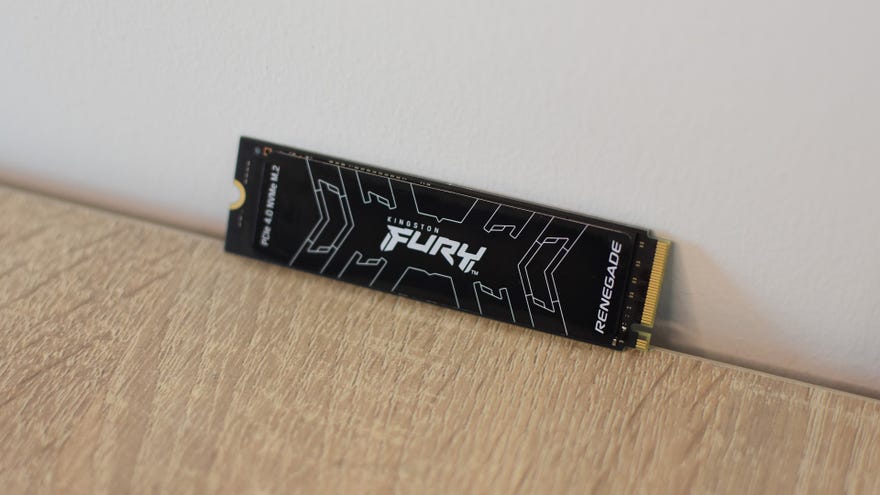Kingston Fury Renegade review: the fastest SSD we’ve tested
Pure PCIe 4.0 power
Oh, this is classic Kingston. I don’t think any other SSD manufacturer so consistently goes quiet for months on end, then suddenly rocks up at your house, slams a world-beating NVMe drive on your desk and wordlessly disappears again. It happened with the A2000, it happened with the KC2500 and now it’s happened with the Fury Renegade.
Granted, this new SSD is a very different proposal to the relatively affordable, for-everyone KC2500. The Fury Renegade is an all-out speed freak of a PCIe 4.0 SSD, promising up to 7300MB/s read speeds and up to 7000MB/s write speeds on the 2TB model that I’ve been testing. All for the high, high price of £308 / $425: double what you’d pay for the 2TB version our current best SSD for gaming pick, the WD Blue SN570. And the Fury Renegade’s 4TB model is more than twice as expensive again, though there are 1TB and 500GB variants too, with the sub-£100 500GB model keeping the quoted read speed of 7300MB/s.
In short, the Fury Renegade is offering a whole lot of speed for a whole lot of cash, just like fellow top-end PCIe 4.0 drives the Samsung 980 Pro and WD Black SN850. And also just like these SSDs, it serves as a reminder that you can rarely take advertised “up to” speeds at face value. In the basic AS SSD sequential benchmark, my Fury Renegade posted a read speed of 5064.9MB/s and a write speed of 5417MB/s: drastically faster than any PCIe 3.0 SSD, on both counts, though clearly some way off transfers over 7000MB/s.
Against the 980 Pro and Black SN850, the Fury Renegade’s sequential write speed result is the best of the bunch, but its sequential read speed drops behind the Samsung’s 5506.9MB/s and the WD’s 5931.9MB/s. How, then, is that headline not just a pack of attention-seeking lies? While it’s true that read speeds are more important that writes when it comes to games, it’s random speeds – not sequential – that will more likely determine the real-life speed of a new SSD. And in these tougher conditions, where data is fetched and sent from irregular spots on the storage rather than in neat sequential rows, the Fury Renegade is consistently the quickest.
Take its showing in AS SSD’s 4K random test: its 98.7MB/s read speed is the finest result of any SSD we’ve got on the books, and its 314.1MB/s write speed comfortably beats the 980 Pro and Black SN850 as well. Kingston’s drive also scored a total victory in the CrystalDiskMark 8 queue/8 thread random test, with a superlative 2695MB/s read speed and a 3549.1MB/s write speed. Of the competition, the Black SN850 comes closest to matching these with a 2614.5MB/s read speed result, though its 2604.7MB/s write speed is much further behind.

If there’s a catch – besides the pricing, obviously – it’s that these performance advantages might not always manifest so tangibly. The Fury Renegade took 9.6 seconds to load a scene from the Cozumel section of Shadow of the Tomb Raider, exactly the same time as the Black SN850. But then, that’s still an elite-level speed, with even the 980 Pro taking 12.1 seconds and the recent WD Black SN750 SE taking 10.4 seconds.
I suppose there are also the usual PCIe 4.0 compatibility concerns, though now that you have your pick of AMD Ryzen 3000, Ryzen 5000 and Intel 12th Gen as compatible CPUs (with a multitude of supportive motherboards available for each), that’s not as high a barrier as it once was. That just leaves the money question: should you pay over £300 for a 2TB SSD, even one as speedy as this?
The Fury Renegade is no match for the humble Blue SN570 on sheer value, though I can see the appeal of such significantly faster read/write speeds for general Windows use as well as gaming; and if you’ve already splashed out on a PCIe 4.0-ready mobo, it’d be a shame not to take advantage. At the time of writing, the 2TB versions of the 980 Pro and Black SN850 are both a little cheaper, though considering the Fury Renegade’s faster random read speeds, the savings aren't big enough to make Kingston’s drive look like a bad deal.
So yeah, sure, if you’re going to drop major coin on an SSD for gaming it might as well be this one. Nice work, Kings- oop, wait, no, they’ve gone again.










